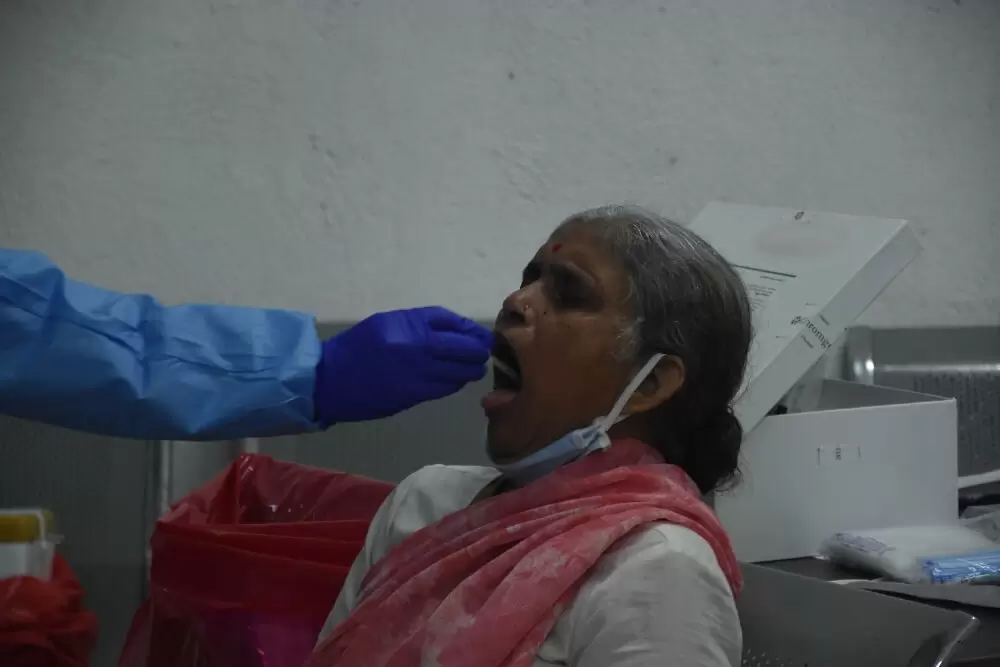Mumbai: 2nd Sero-survey from Aug 10 to avow herd immunity
QUAID NAJMI
| MUMBAI
30-July-2020

Photo: IANS
Buoyed by the encouraging results of the first Serological Surveillance for SARS-CoV2 Infection, the BrihanMumbai Municipal Corporation (BMC) will conduct another similar survey from August 10, a top official said here on Thursday.
"It will be conducted in the regions of Matunga, Sion, Wadala (F/North), Chembur, Tilak Nagar (M/West) and Dahisar, Mandapeshwar (R/North), with a similar sample size but with different people from slums and housing complexes," Kakani told IANS.
The outcome of the second survey -- likely to be available by early-September -- would enable the health authorities to state with confidence the developing or prevalence of 'herd immunity' in those regions, and chart out a Covid-19 combat strategy for other parts of Mumbai, he added.
The country's biggest cross-sectional antibodies survey, it was conducted by the BMC along with NITI Aayog and TISS for 12-14 days in the first half of July, covering 6,936 people which threw up unanticipated results.
Among other things, it pointed at women and slumdwellers leading the march towards a 'herd immunity' against Covid-19 in Mumbai - the country's worst-hit city.
The survey showed that 57 per cent of those tested in the slums were exposed to and developed antibodies against the SARS-CoV-2 Virus, compared to merely 16 per cent in housing complexes.
Watch This TWL Video
For the slums, the figures thrown up were 59.30 per cent women (out of 2,297 tested) and 53.20 per cent men (out of 1,937 tested), who had developed antibodies against Covid.
In the housing complexes, 16.80 per cent of the women tested and 14.90 per cent of the men tested had developed the antibodies.
The BMC interprets this high exposure in slums to shared common facilities like toilets, water-taps, high population density and lack of physical distancing compared to the residents in housing complexes.
With the results suggesting more asymptomatic infections, this higher exposure in slums points to an extremely low death-rate in Mumbai - "as low as 0.05 to 0.10 per cent" - instead of the existing 5.5 per cent.
The official explained that the presence of antibodies indicated that the person had been infected, battled it away and in the process developed a certain level of resistance to the virus.
Accordingly, more people with antibodies in a community is considered a positive sign as the virus had limited scope to spread, implying success of measures like wearing masks, physical distancing, etc, in these areas.
Simultaneously, even the presence of antibodies among fewer persons in the housing complexes is considered encouraging as it indicates lesser number of infectees, due to better hygiene, more physical distancing and other interventions by the BMC, the official added.
"These results will be valuable to learn more about 'herd immunity'. Although it is still unclear at what level of prevalence does herd immunity kicks in, findings indicate that, at least in slums, this could be attained sooner than later, if the immunity exists and persists in a significant proportion of the population," the BMC informed.
The Anti-SARS-CoV2-IgG antibodies were detected using Chemiluminescence assay (CLIA) by Abbott group, in what is billed as the largest such cross-sectional survey in India.
It was carried out in collaboration with Kasturba Molecular Diagnostic Laboratory, Translational Health Science and Technology Institute, ATE Chandra Foundation and IDFC Institute.
The development comes a fortnight after the World Health Organisation (WHO) on July 11 acknowledged the success of Maharashtra government in combating the Covid-19 outbreak in Dharavi, the largest slum in Asia. - IANS
More Headlines
Bajrang Dal Appeals to Ban Oyo Check-Ins for Unmarried Couples in Bengaluru
Heavy Rains Predicted In Five TN Districts On January 11
Cold Wave Grips Rajasthan: Fatehpur Hits 1.1°C, Nagaur 1.7°C
Actor Ajith Kumar Escapes Unharmed After Crash During 24H Dubai Practice
32 Dead As 7.1 Magnitude Earthquake Strikes Nepal-Tibet Border
Bajrang Dal Appeals to Ban Oyo Check-Ins for Unmarried Couples in Bengaluru
Heavy Rains Predicted In Five TN Districts On January 11
Cold Wave Grips Rajasthan: Fatehpur Hits 1.1°C, Nagaur 1.7°C
Actor Ajith Kumar Escapes Unharmed After Crash During 24H Dubai Practice
32 Dead As 7.1 Magnitude Earthquake Strikes Nepal-Tibet Border










